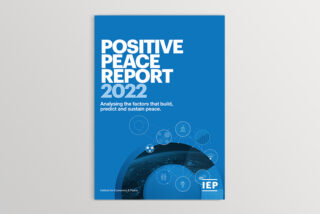The Institute for Economics & Peace believes that healthcare professionals can play a vital role in promoting Positive Peace within their communities by using their expertise, influence and positions of trust to carry out effective healthcare services which are regularly enhanced when aligned with the eight Pillars of Positive Peace.
When we consider the aspects of modern-day healthcare, health initiatives have the potential for affective peacebuilding in a range of settings. The potential outreach for healthcare is perhaps one of the industry’s greatest facets as the trust, care and knowledge we often associate with healthcare professionals is enough to overlook interpersonal barriers often determined by culture, language and religion. Furthermore, this has the potential to extend healthcare and its peacebuilding potential from hospitals and communities to conflict areas, poverty-stricken regions and areas recovering from natural disasters.
There are a range of ways in which Healthcare can engage with Positive Peace. The process of doing so enhances the role of healthcare professionals, as we consider their ability to aid in the building of peaceful societies. By engaging healthcare initiatives with the interconnected Pillars of Positive Peace, we can see the potential for healthcare as a peacebuilder in a range of settings:
Empowering communities, especially those in conflict, with preventive health education by encouraging government incentives towards the maintenance of healthy lifestyles and addressing the causes of health issues.
Regulating an appropriate understanding of cultures through respecting diversity in backgrounds, views and beliefs of all members of the community being served. Healthcare professionals have the ability to address the importance of the non-discriminatory provision of services whilst bridging cultural gaps and barriers between community members.
Healthcare representatives regularly maintain high levels of trust, which is strengthened by active cooperation and engagement in the community. Some examples is through involvement in community-based events, initiatives and committees.
Often subject to tense and confronting situations, healthcare professionals apply effective conflict resolution skills to de-escalate situations.
Healthcare professionals have the power to share information regarding the extent to which conflict can impact health. As a result, communities can regulate an empathetic and informed societal approach towards health issues.
Healthcare settings can promote the use of nonviolent communication and conflict resolution dialogue, whilst providing resources for individuals, groups and family to understand peaceful dispute resolution.
Healthcare should not be a matter of affordability; peacebuilding initiatives drive the notion that healthcare should be accessible to poverty and disaster-stricken areas, where resources are usually dire.
Healthcare professionals have the ability to educate others on the importance of ensuring a safe and ergonomically sound workplace where discrimination is non-existent, and the mental health of employees is prioritised.
As peace continues to deteriorate particularly in areas around the world where climate, terrorism, war and poverty have forced civilians into despair, healthcare looks to withhold the greatest potential for future peacebuilding. IEP’s eight Pillars of Positive Peace portray how actions for peace can shape health initiatives, in order to make the work of health professionals applicable across a range of international settings.

Download the Positive Peace Report 2022.
Positive Peace Report 2022